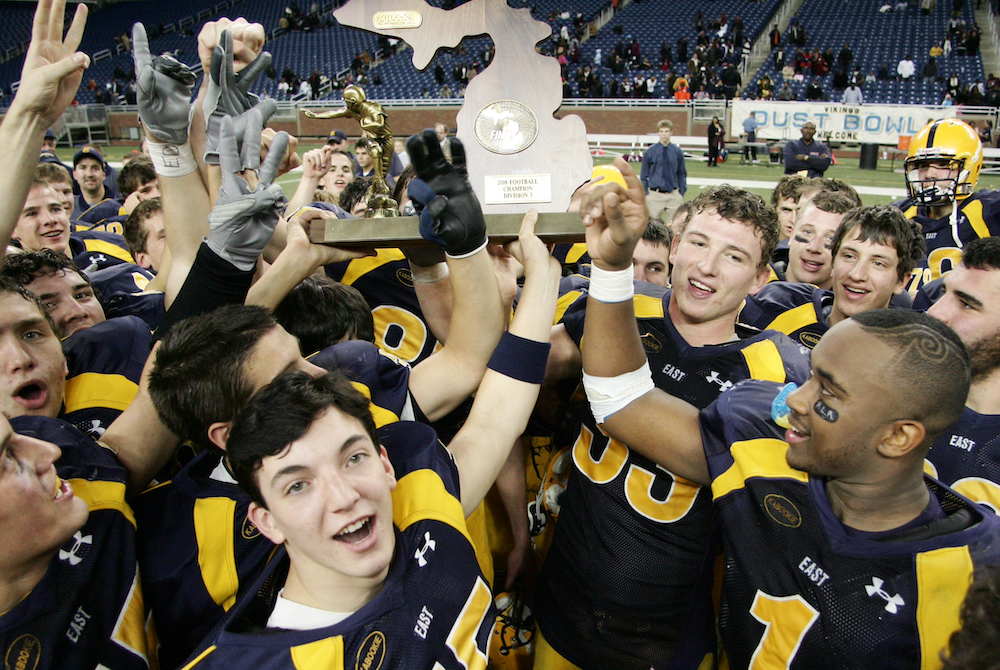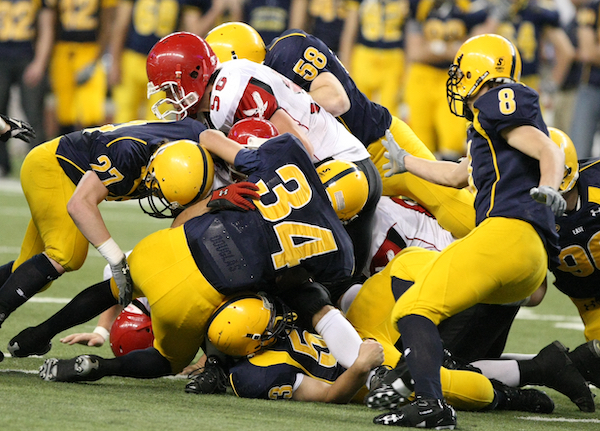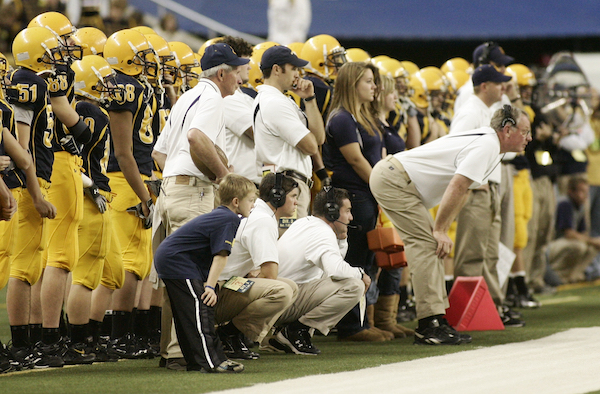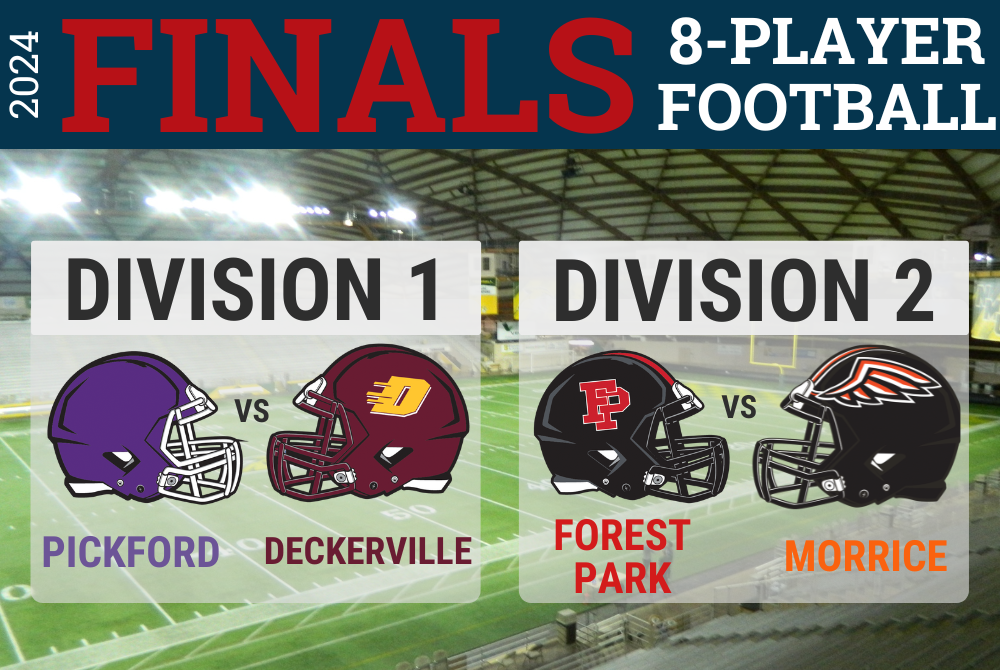
EGR 5-Year Title Run Remains Awe-Inspiring, Product of More Than Talent Alone
By
Steve Vedder
Special for MHSAA.com
November 25, 2022
It was Peter Stuursma's first year at East Grand Rapids and while the wolves weren't necessarily knocking at the door, they were definitely on the prowl.
The tradition-rich Pioneers football team had slumped to an uncharacteristic 3-6 record in Stuursma's first season as varsity head coach in 2000, and there were subtle signs a community used to winning was growing restless with the program's direction.
That's when Stuursma bumped into one of his players coming out of the weight room, and the two had a quick conversation which he clearly remembers 22 years later.
"It was this senior offensive lineman and all he said was, 'Don't worry about it Coach, it's not going to happen again. We got this,’" Stuursma said. "We had just gone 3-6, and I'm wondering how we're going to get this going and that they might get rid of me. You never underestimate what people can do."
East Grand Rapids, under legendary coach George Barcheski, had been the dominant football program in West Michigan with 28 winning seasons over 29 from 1970-99, and 38 victories in 39 games from 1993-95, along with Class B championships in 1976 and 1983. After Stuursma replaced the retiring Barcheski,, some in the community were expecting more of the same when it came to success.
Those fans never dreamed what they would see as the Pioneers promptly pieced together arguably the greatest decade-long stretch in Michigan high school football history – and without doubt one of the most incredible five-year runs of dominance.
Even that optimistic offensive lineman couldn't have imagined a remarkable 126-7 record over the next 11 years, a 40-3 MHSAA Tournament mark and seven Finals championships. Five of those titles (2006-10) came in a row, a feat accomplished just three times in the now 46-year history of the playoffs.
 The five straight championships were part of an amazing era that Stuursma and his players say has not diminished with time. They recall no single factor explained going 67-3 overall over those five seasons. There was talent, obviously, but coaching, tradition, confidence and strength of community all played vital parts. There were Thanksgiving practices attended by hundreds of former football alumni, dedicated fan support that included playing before more than 30,000 fans at least twice at Ford Field, and a program-wide attitude that, while some may call it a cliché, proved that success did indeed breed success.
The five straight championships were part of an amazing era that Stuursma and his players say has not diminished with time. They recall no single factor explained going 67-3 overall over those five seasons. There was talent, obviously, but coaching, tradition, confidence and strength of community all played vital parts. There were Thanksgiving practices attended by hundreds of former football alumni, dedicated fan support that included playing before more than 30,000 fans at least twice at Ford Field, and a program-wide attitude that, while some may call it a cliché, proved that success did indeed breed success.
"I'm in awe of the scope of things," said Stuursma, whose team used back-to-back Division 3 championships in 2002-03 as a springboard to later success. "Because we had won a couple times before it just started to feel normal. We had such support the community used to think Thanksgiving break ended at Ford Field."
EGR teams would find all kinds of ways to win during the five-year title stretch. The 2009 team, for instance, barreled through its first four playoff opponents by a combined score of 164-29 until a 24-21 win over Orchard Lake St. Mary’s in the Final. The 2010 team had to win three playoff games by eight points or fewer to finish off its perfect 14-0 record. And then there was the wild 46-39 five-overtime win over St. Mary's in the 2007 Final during which the Pioneers had to score on all five possessions in overtime to outlast the Eaglets.
While teams always seemed to find ways to get the victory, former players remember what it was like to be part of a seemingly endless tradition of success on the football field.
"One of the things that was so special about East Grand Rapids were the expectations," said Luke Glendening, a running back on the 2006 team who has gone on to a long NHL career with the Detroit Red Wings and Dallas Stars. "During the game I'd look around and see guys who had played here a long time ago. I viewed it as a privilege to have the opportunity to play before the alumni and community."
Quarterback Ryan Elble, who completed a combined 34 passes for 483 yards and seven touchdowns during the 2008 and 2009 Finals, also used the word "honored" to describe his high school experience.
"The culture was to win. Coach Stuursma made it fun, and it always seemed to take shape on the field," said Elble, who went on to play baseball at Miami (Ohio) "I think each team had different skill sets, but at the end of the day it was our culture and putting in the work to spend Thanksgiving weekend at Ford Field."
The players point to that winning culture over talent. Elble said he played with only one eventual Division I college player in linebacker/running back Trent Voss, who went on to Toledo. Nobody wins without talent, of course, but they point to many other factors as being just as critical. Because EGR coaches would always work juniors into the lineup, Stuursma said the program faced only one major rebuild, in 2007. That team wound up 13-1 and the second of those five straight champions.
 "We had some incredible players," said Stuursma, who left EGR in 2016 to lead Hope College to two Michigan Intercollegiate Athletic Association titles, three second-place finishes and a 46-15 overall record over his seven seasons. "We returned only two starters (in 2007), but we still had good guys who wanted to win."
"We had some incredible players," said Stuursma, who left EGR in 2016 to lead Hope College to two Michigan Intercollegiate Athletic Association titles, three second-place finishes and a 46-15 overall record over his seven seasons. "We returned only two starters (in 2007), but we still had good guys who wanted to win."
The players say the culture started with Barcheski and the program's tradition. As Hope College's coach, Stuursma said there’s a similar common thread among schools he sees on recruiting visits: a winning tradition that, in Stuursma's words "screams excellence," from every corner of the building. He sees it the minute he walks into some schools, and East Grand Rapids had the same culture before he arrived. The past players say it played a major part in their careers.
That tradition didn't start with the five straight titles, said former quarterback Kyle Cunningham, who played on the 2002-03 teams and went 46-0 over four years from his freshman to senior seasons. Those two championship teams’ most recognizable player was running back Kevin Grady, who still holds multiple MHSAA records including for career rush yardage and went on to play at University of Michigan.
"We worked hard and had a lot of pride," he said. "I remember watching film of earlier teams, and I remember hoping our team could stand up the same way."
While the players point to tradition and community, Ryan Blair, a tight end/defensive tackle on the 2006-08 champion clubs, said talent remained critical – but EGR was outmanned physically in some of those title games. That's when camaraderie and the confidence that someone was going to make a key play took over. The Pioneers' remarkable run was teeming with such plays.
"Certainly we were never one of the biggest teams there, we never had a big size advantage in any game," he said. "But we had this camaraderie on every team. We had guys who really liked playing with each other. When things got tight we stuck together, and we'd fight to the fourth quarter or beyond."
Despite the long odds of winning a single state title let alone repeating, Stuursma believes there could be a team one day which wins six straight. That team will have the same characteristics of those EGR teams – the talent, coaching, tradition and fortune of catching timely breaks – but it can be done, he said.
"Absolutely," Stuursma said. "The only record I can think of that won't be broken is Wayne Gretzky's (NHL) scoring record. It will take a lot, but records are made to be broken. I think high school football is on the upswing and there would have to be an emphasis on winning. You would have to have a good path to get there, but I can see someone getting six one day."
PHOTOS (Top) East Grand Rapids celebrates its third-straight Division 3 championship win in 2008. (Middle) Pioneers converge on an Orchard Lake St. Mary’s ball carrier during the 2007 five-overtime title decider. (Below) EGR coach Peter Stuursma, kneeling center, monitors the action during the 2010 championship game.

1st & Goal: 2024 8-Player Finals Preview
By
Geoff Kimmerly
MHSAA.com senior editor
November 22, 2024
For the first time since 8-player football was split into two divisions in 2017, all four teams playing in this season’s MHSAA Finals are past champions.
 Deckerville and Pickford in Division 1, and Crystal Falls Forest Park and Morrice in Division 2 have all won one title during the first 13 years of 8-player playoffs. All four also are making their first championship appearances this decade.
Deckerville and Pickford in Division 1, and Crystal Falls Forest Park and Morrice in Division 2 have all won one title during the first 13 years of 8-player playoffs. All four also are making their first championship appearances this decade.
Deckerville and Pickford kick off at 11 a.m. Saturday at Northern Michigan University’s Superior Dome, and Morrice and Crystal Falls Forest Park follow at 2 p.m. Tickets cost $10 and are good for both games, and may be purchased online through NMU or at the door – click for details. Both games will be broadcast live on MHSAA.tv, and audio of both games will be streamed live on MHSAANetwork.com.
Below is a look at all four finalists:
Division 1
DECKERVILLE
Record/Rank: 12-0, No. 1
Coach: Bill Brown, 32nd season (258-90)
League finish: First in Big Thumb Conference Blue
Championship history: 8-player (single division) champion 2012, two runner-up finishes.
Best wins: 49-32 over No. 7 Mendon in Semifinal, 40-6 (Regional Final) and 44-0 over No. 8 Kingston, 54-34 (Regional Semifinal) and 50-16 over Bay City All Saints, 50-42 over No. 2 Alcona, 30-28 over Brown City.
Players to watch: QB Hunter Garza, 6-1 sr. (1,488 yards/26 TDs rushing, 804 yards/10 TDs passing); SE/DB Ian Flanagan, 6-1 jr. (230 yards/3 TDs receiving); RB/DB Parker Merriman, 5-10 sr. (1,003 yards/14 TDs rushing); RG/DE Preston Holman, 6-1 sr. (Weights not provided. Statistics through Regional Final.)
Outlook: Deckerville will be playing in its first championship game since finishing runner-up in both 2016 (single division) and 2017 (Division 1), and after reaching the Semifinals a year ago. Alcona and Brown City were the only opponents to get within 17 points of the Eagles this fall. There are only seven seniors, but they combine to fill seven of the 16 starting spots. Holman made the all-state second team last season, and Garza earned an honorable mention.
PICKFORD
Record/Rank: 12-0, No. 3
Coach: Josh Rader, 21st season (153-66)
League finish: First in Great Lakes Eight Conference East
Championship history: Division 2 champion 2019, Division 1 runner-up 2018.
Best wins: 34-18 over No. 5 Indian River Inland Lakes in Semifinal, 44-6 (Regional Final) and 65-14 over No. 10 Ishpeming, 51-6 over Norway, 40-12 over Division 2 No. 6 Powers North Central.
Players to watch: QB/DE Tommy Storey, 5-9/175 sr. (1,656 yards/28 TDs passing, 954 yards/16 TDs rushing); RB/DB Gunner Bennin, 6-0/165 jr. (828 yards/19 TDs rushing, 386 yards/8 TDs receiving); TE/DE Ian Browne, 6-3/175 sr. (206 yards/4 TDs receiving); OG/DT Haydn Rader, 6-1/210 sr.
Outlook: Storey is a returning all-state first-teamer who also quarterbacked the team to the Semifinals a year ago. He leads an attack that’s rushed for 3,768 yards – at more than 10 a carry – but can keep defenses honest with a passing game as well. In addition to being the team’s second-leading rusher and leading receiver, Bennin has a team-high four interceptions and has also scored on defense and as a kick and punt returner. Haydn Rader made the all-state second team last season and with Storey, Browne and Bennin is among eight players who start on both sides of the ball.
Division 2
CRYSTAL FALLS FOREST PARK
Record/Rank: 11-1, No. 3
Coach: Brian Fabbri, fifth season (35-11)
League finish: Second in Great Lakes Eight Conference West
Championship history: Division 2 champion 2017, three MHSAA titles and 10 runner-up finishes in 11-player.
Best wins: 34-12 over No. 6 Powers North Central in Regional Final, 49-24 over No. 8 Onekama in Semifinal, 42-20 over Norway.
Players to watch: RB/DB Dax Huuki, 6-0/175 soph. (1,424 yards/20 TDs rushing); QB/DB Vic Giuliani, 6-2/165 soph. (908 yards/14 TDs passing, 7 TDs rushing); RB/DE Grayson Sundell, 6-1/190 sr. (899 yards/17 TDs rushing); TE/DT Kevin Giuliani, 6-5/270 sr. (277 yards/6 TDs receiving).
Outlook: Forest Park will play in its first championship game since its title-winning season in 2017 and picked up major steam with its Regional Final win over rival North Central, which avenged a 45-34 league title-deciding loss from Week 9. No other opponent got within 20 points of the Trojans this season. Kevin Giuliani made the all-state second team last season and is one of seven two-way starters. Junior Trent Kannich is another and has 406 yards and seven touchdowns rushing and a team-high 364 yards receiving from his fullback spot. Senior linebacker Brody Starr has five interceptions and has returned two for touchdowns, and senior linebacker Nik Stephens has four picks and one for a score.
MORRICE
Record/Rank: 11-1, No. 5
Coach: Kendall Crockett, 11th season (96-25)
League finish: Tied for first in Mid-State Activities Conference Red
Championship history: Division 1 champion 2018.
Best wins: 36-0 over No. 4 Britton Deerfield in Semifinal, 46-14 (Regional Final) and 38-6 over Mount Pleasant Sacred Heart, 28-22 over No. 7 Portland St. Patrick in Regional Semifinal, 22-0 over Fulton.
Players to watch: RB/DB Joel Fisher, 5-7/139 sr. (1,687 yards, 19 TDs rushing); WR/DB Wyatt Valentine, 5-10/163 soph. (50 tackles, 10 interceptions); RB/OLB Wyatt Cartier, 5-7/150 sr. (1,468 yards, 27 TDs rushing), OG/DE Travis Smith, 6-0/215 sr.
Outlook: Morrice also avenged its lone regular-season loss to advance this postseason, having lost to St. Patrick 29-12 in Week 4 before opening the playoffs with a win over the Shamrocks. Fisher and Cartier are a dynamite 1-2 punch in the backfield, and Fisher made the all-state second team last season. Smith earned an honorable mention in 2023 and is joined on both lines by 6-foot-3, 215-pound junior Oliver Long, who has 12 sacks. Junior linebacker Austin Gutting is the leading tackler for a defense giving up only 10 points per game.
MHSAA.com's weekly “1st & Goal” previews and reviews are powered by MI Student Aid, a division within the Department of Lifelong Education, Advancement, and Potential (MiLEAP). MI Student Aid encourages students to pursue postsecondary education by providing access to student financial resources and information. MI Student Aid administers the state’s scholarship and grant programs that help make college Accessible, Affordable and Attainable for you. Click to connect with MI Student Aid and find more information on Facebook and Twitter @mistudentaid.

